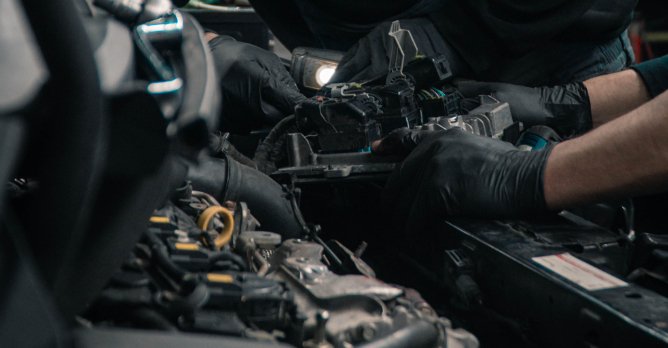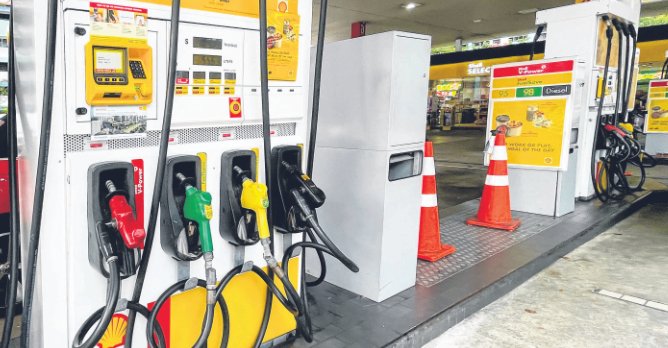How to pump petrol in Singapore like a true-blue petrolhead
24 Nov 2021|26,954 views
It is understood that choosing the right kind of petrol for your vehicle is crucial. While inexperienced drivers might base their decision on petrol costs alone, one must consider the car's fuel efficiency, performance, and vehicle requirements.
Types of petrol in Singapore

The numbers correspond to the octane ratings of the petrol, which indicates the fuel's stability in general.
A higher-octane rating would suggest that the fuel is more stable. This stability refers to the fuel's resistance to pre-ignition, with higher stability indicating a lesser likelihood of pre-ignition.
What is pre-ignition?

On the other hand, pre-ignition occurs when something, such as burning carbon embers, glowing hot or melted spark plus or exhaust valves, ignites the air/fuel mixture in the engine during the compression stroke, resulting in engine failure, melting of spark plugs and melted holes in pistons.
The occurrence of pre-ignition makes a loud knocking noise, which can damage the car's engine pistons and cylinder walls which are crucial to the vehicle and are costly to fix or replace.

What type of petrol should you use?

While 98-octane and other premium grades of petrol like V-power, Synergy Supreme+ or equivalent may be the best in the market, it might not equate to the 'best performance' for your car.
A high-performance car is built for speed and can hit the century sprint in less than 10-seconds. To achieve this result, the engine uses extremely high temperature and pressure. 98-Octane (or higher) petrol can withstand such conditions to allow the engine to extract the maximum amount of power from the fuel.
Therefore, pumping the best petrol does not give your car more power as power is dependent on the engine. It would be a complete waste of money if you pump grade octane in your car when it only requires 95-Octane to run smoothly.
Petrol prices in Singapore
Even though different petrol companies set different prices for their fuel, tracking the costs of various fuel grades isn't that difficult with our live petrol cost tracker!
| Petrol Grade | Petrol Price (Average) |
| 92-Octane | $2.55 - $2.65 per litre |
| 95-Octane | $2.58 - $2.69 per litre |
| 98-Octane | $3.06 - $3.32 per litre |
*The prices reflected in the above table are accurate as of 24th November 2021
While $0.40 difference might not look like a lot, one should consider how this would factor into a car's annual running costs.
According to research conducted by the Land Transport Authority (LTA), the average mileage of a privately owned car in Singapore is about 17,500km/year.
Let's use a Toyota Altis as an example here.
An Altis gets a fuel consumption (FC) of about 15.4km per litre (on average). Using this information, we can get the average annual petrol cost based on all three fuel grades.
| Petrol Grade | Petrol Price Per Year (Average) |
| 92-Octane | $2,897 - $3,011 |
| 95-Octane | $2,931 - $3,056 |
| 98-Octane | $3,477 - $3,772 |
See the difference now? Multiply that by 10 years.
What about petrol credit cards?

As such, local banks offer credit cards tied with discounts for petrol so that customers can aggregate their spending on one card instead of carrying multiple cards.
Depending on the type of credit card, drivers can enjoy a discount from 14% to 23% at a selected petrol company's station. Additionally, they would be able to enjoy the usual cashback and discounts that the card offers on other categories.

Sgcarmart
Compare the Best Petrol Credit Cards
Save up to 25% on your petrol bills!
- Maximise your savings at Shell, ESSO, Caltex & SPC petrol stations
- Apply to receive welcome offers and online promotions!
Here are some related articles that might interest you:
Are electric cars cheaper to insure compared to petrol cars in Singapore?
Petrol stations: Does it matter which one you go to?
Do fuel injector cleaners and octane boosters work?
Can you actually save money by buying a hybrid car?
7 ways to reduce car running costs
It is understood that choosing the right kind of petrol for your vehicle is crucial. While inexperienced drivers might base their decision on petrol costs alone, one must consider the car's fuel efficiency, performance, and vehicle requirements.
Types of petrol in Singapore

The numbers correspond to the octane ratings of the petrol, which indicates the fuel's stability in general.
A higher-octane rating would suggest that the fuel is more stable. This stability refers to the fuel's resistance to pre-ignition, with higher stability indicating a lesser likelihood of pre-ignition.
What is pre-ignition?

On the other hand, pre-ignition occurs when something, such as burning carbon embers, glowing hot or melted spark plus or exhaust valves, ignites the air/fuel mixture in the engine during the compression stroke, resulting in engine failure, melting of spark plugs and melted holes in pistons.
The occurrence of pre-ignition makes a loud knocking noise, which can damage the car's engine pistons and cylinder walls which are crucial to the vehicle and are costly to fix or replace.

What type of petrol should you use?

While 98-octane and other premium grades of petrol like V-power, Synergy Supreme+ or equivalent may be the best in the market, it might not equate to the 'best performance' for your car.
A high-performance car is built for speed and can hit the century sprint in less than 10-seconds. To achieve this result, the engine uses extremely high temperature and pressure. 98-Octane (or higher) petrol can withstand such conditions to allow the engine to extract the maximum amount of power from the fuel.
Therefore, pumping the best petrol does not give your car more power as power is dependent on the engine. It would be a complete waste of money if you pump grade octane in your car when it only requires 95-Octane to run smoothly.
Petrol prices in Singapore
Even though different petrol companies set different prices for their fuel, tracking the costs of various fuel grades isn't that difficult with our live petrol cost tracker!
| Petrol Grade | Petrol Price (Average) |
| 92-Octane | $2.55 - $2.65 per litre |
| 95-Octane | $2.58 - $2.69 per litre |
| 98-Octane | $3.06 - $3.32 per litre |
*The prices reflected in the above table are accurate as of 24th November 2021
While $0.40 difference might not look like a lot, one should consider how this would factor into a car's annual running costs.
According to research conducted by the Land Transport Authority (LTA), the average mileage of a privately owned car in Singapore is about 17,500km/year.
Let's use a Toyota Altis as an example here.
An Altis gets a fuel consumption (FC) of about 15.4km per litre (on average). Using this information, we can get the average annual petrol cost based on all three fuel grades.
| Petrol Grade | Petrol Price Per Year (Average) |
| 92-Octane | $2,897 - $3,011 |
| 95-Octane | $2,931 - $3,056 |
| 98-Octane | $3,477 - $3,772 |
What about petrol credit cards?

As such, local banks offer credit cards tied with discounts for petrol so that customers can aggregate their spending on one card instead of carrying multiple cards.
Depending on the type of credit card, drivers can enjoy a discount from 14% to 23% at a selected petrol company's station. Additionally, they would be able to enjoy the usual cashback and discounts that the card offers on other categories.

Sgcarmart
Compare the Best Petrol Credit Cards
Save up to 25% on your petrol bills!
- Maximise your savings at Shell, ESSO, Caltex & SPC petrol stations
- Apply to receive welcome offers and online promotions!
Here are some related articles that might interest you:
Are electric cars cheaper to insure compared to petrol cars in Singapore?
Petrol stations: Does it matter which one you go to?
Do fuel injector cleaners and octane boosters work?
Can you actually save money by buying a hybrid car?
7 ways to reduce car running costs















